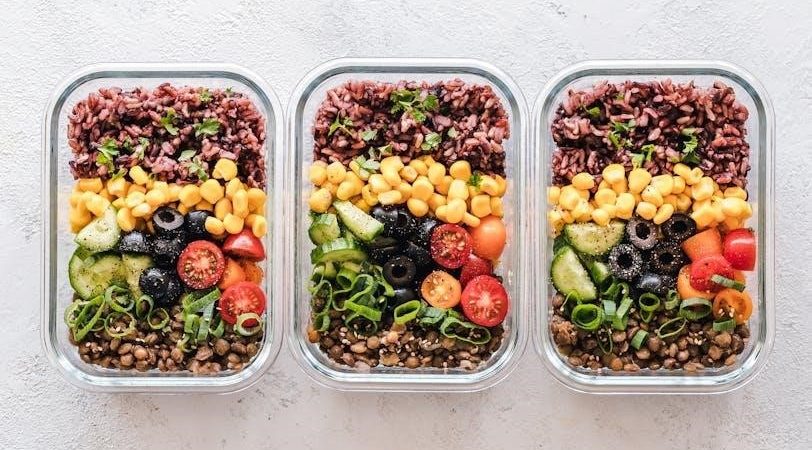This guide provides a comprehensive approach to nutrition, offering meal plans and expert tips to optimize fertility. It emphasizes the role of diet in IVF success.
1.1 Overview of the Importance of Diet in IVF Success
Diet plays a crucial role in IVF success by optimizing reproductive health and improving egg and sperm quality. A well-balanced diet rich in antioxidants, vitamins, and minerals supports hormone regulation and reduces inflammation. The Mediterranean diet, emphasizing whole grains, fruits, vegetables, and healthy fats, is often recommended. Maintaining a healthy weight and avoiding processed foods can enhance fertility. A tailored nutrition plan not only boosts IVF outcomes but also promotes overall well-being, increasing the chances of a successful pregnancy;
1.2 Benefits of Following a Fertility Diet
Adopting a fertility-focused diet offers numerous benefits, including improved hormone balance, enhanced egg and sperm quality, and increased conception chances. It supports weight management, reducing insulin resistance and inflammation. A diet rich in antioxidants, omega-3 fatty acids, and essential nutrients promotes reproductive health. By focusing on whole, nutrient-dense foods, individuals can optimize their fertility potential, setting a strong foundation for IVF success and overall well-being. This approach is a proactive step toward achieving a healthy pregnancy.

Key Components of an IVF Diet Plan
A well-structured IVF diet includes the Mediterranean diet, whole grains, fruits, vegetables, nuts, seeds, and fatty fish like salmon; It emphasizes antioxidants, vitamins, and minerals.
2.1 Mediterranean Diet and Its Role in Fertility
The Mediterranean diet is rich in fruits, vegetables, whole grains, nuts, seeds, and fatty fish, promoting fertility by improving egg and sperm quality. It includes olive oil, reducing inflammation and enhancing reproductive health. Studies show it boosts IVF success rates by balancing hormones and improving insulin sensitivity. Incorporating this diet supports overall well-being, making it a recommended choice for those undergoing fertility treatments.
2.2 Essential Nutrients for Fertility: Antioxidants, Vitamins, and Minerals
Antioxidants, such as CoQ10, protect eggs and sperm from oxidative damage, improving quality. Key vitamins like folate, B6, and B12 support hormone regulation and embryo development. Minerals like zinc, selenium, and iron are vital for reproductive health. These nutrients help balance hormones, enhance fertility, and support overall reproductive function, making them crucial components of an IVF diet plan. Incorporating foods rich in these nutrients can significantly improve IVF outcomes and overall well-being.
2.3 Importance of Whole Grains, Fruits, and Vegetables
Whole grains, fruits, and vegetables are foundational in an IVF diet, providing essential vitamins, minerals, and fiber. They help regulate blood sugar and insulin levels, improving fertility. Folate-rich leafy greens and berries support embryo development. These foods also contain antioxidants that protect reproductive cells from damage. Incorporating a variety ensures a balanced intake of nutrients, enhancing overall reproductive health and improving IVF success rates. They are key components of a fertility-friendly diet.
The Impact of Weight on Fertility
Weight significantly influences fertility, as excess weight can cause hormonal imbalances and insulin resistance, affecting IVF outcomes. Maintaining a healthy weight optimizes reproductive health and improves success rates.
3.1 How Being Overweight Affects Fertility
Excess weight disrupts hormonal balance, reducing fertility potential. It increases insulin resistance, lowers sex hormone-binding globulin, and raises androgen levels, leading to irregular cycles and poor egg quality. Obesity also exacerbates inflammation, further impairing reproductive health. Maintaining a healthy weight is crucial for optimizing fertility and improving IVF outcomes, as even modest weight loss can enhance hormonal function and overall reproductive well-being.
3.2 Weight Loss and Its Positive Effects on IVF Outcomes
Modest weight loss significantly enhances fertility and IVF success. It improves insulin sensitivity, balances hormones, and boosts egg and sperm quality. A healthier BMI reduces inflammation and oxidative stress, creating a more favorable environment for conception. Studies show that even a 5-10% reduction in body weight increases pregnancy rates in overweight women undergoing IVF. Sustainable weight management through diet and exercise is a key strategy for optimizing reproductive health and improving IVF outcomes.

Sample Meal Plans for IVF
Discover structured meal plans tailored for IVF success, featuring Mediterranean-inspired breakfast, lunch, and dinner ideas. Focus on fertility-boosting foods and avoid processed or sugary options for optimal results.
4.1 7-Day Mediterranean Diet Plan for IVF
This 7-day plan focuses on whole grains, fruits, vegetables, beans, nuts, and fatty fish. It includes breakfast ideas like oatmeal with berries, lunches featuring grilled chicken salads, and dinners such as baked salmon with quinoa. Snacks include nuts and seeds. The plan avoids processed foods and sugary drinks, promoting a balanced intake of antioxidants, vitamins, and minerals to support fertility and IVF outcomes.
4.2 14-Day Fertility Meal Plan: Breakfast, Lunch, and Dinner Ideas
This 14-day plan offers diverse, fertility-boosting meals. Breakfasts include options like scrambled eggs with spinach or Greek yogurt with nuts. Lunches feature salads with grilled chicken or fish, while dinners focus on dishes like roasted vegetables with lean meats. The plan emphasizes whole, nutrient-rich foods, providing a structured guide to support IVF success through balanced nutrition and essential vitamins and minerals.

Foods to Include and Avoid
Incorporate nuts, seeds, whole grains, fruits, and vegetables rich in antioxidants, vitamins, and minerals. Avoid processed foods, tinned tuna, and sugary drinks that can hinder fertility.
5.1 Fertility-Boosting Foods: Nuts, Seeds, and Fatty Fish
Nuts and seeds are rich in healthy fats, protein, and minerals, supporting hormonal balance and fertility. Fatty fish, like salmon, provide omega-3s, essential for egg quality and hormonal health. Walnuts and chia seeds are particularly beneficial due to their omega-3 content, while flaxseeds support hormone production. These foods help improve sperm quality and overall reproductive health, making them key components of a fertility-enhancing diet for both men and women.
5.2 Foods to Avoid: Processed Foods, Tinned Tuna, and Sugary Drinks
Processed foods, high in unhealthy fats and sugars, can lead to inflammation and insulin resistance, negatively impacting fertility. Tinned tuna lacks omega-3s and contains mercury, which may harm reproductive health. Sugary drinks contribute to weight gain and metabolic issues, reducing IVF success. Limiting these foods and opting for fresh, nutrient-rich alternatives helps create a healthier environment for conception and improves overall fertility outcomes for both partners.
Lifestyle Factors Beyond Diet
Lifestyle factors such as regular exercise, yoga, and avoiding tobacco and alcohol play a crucial role in enhancing fertility and IVF success.
6.1 Exercise and Yoga for Fertility
Regular exercise and yoga can significantly improve fertility by balancing hormones, reducing stress, and enhancing blood flow to reproductive organs. Fertility yoga, designed for hormonal balance, is accessible to all women. Moderate physical activity, such as brisk walking or swimming, supports overall health without over-exertion. Avoid excessive workouts, as they may negatively impact fertility. Incorporating yoga and exercise into daily routines can complement a healthy diet, promoting better IVF outcomes and emotional well-being.
6.2 Avoiding Tobacco and Alcohol for Better IVF Outcomes
Avoiding tobacco and alcohol is crucial for improving IVF success. Tobacco damages sperm DNA and reduces fertility, while alcohol disrupts hormonal balance and impairs reproductive function. Both substances can lower egg and sperm quality, reducing conception chances. Quitting smoking and limiting alcohol intake can significantly enhance fertility outcomes. Couples should avoid these substances entirely during IVF treatment to optimize results and support a healthy pregnancy. This lifestyle change is a key factor in achieving IVF success.

Grocery Shopping Guide
Create a fertility-friendly grocery list focusing on whole grains, fruits, vegetables, nuts, seeds, and fatty fish. Plan meals, shop smart, and prep for success.
7.1 Creating a Fertility-Friendly Grocery List
Focus on whole grains, fresh fruits, and vegetables. Include nuts, seeds, and fatty fish for essential nutrients. Avoid processed foods and added sugars. Plan meals weekly to ensure variety and nutrition. Stock up on olive oil, herbs, and spices for healthy cooking. Consider batch buying items like quinoa and oats for convenience. A well-organized list helps maintain a balanced diet, supporting fertility and overall well-being.
7.2 Batch Cooking Tips for Meal Preparation
Batch cooking simplifies meal preparation, saving time and ensuring consistent nutrition. Plan meals for the week, prepare grains like quinoa or brown rice in bulk, and cook proteins such as lean meats or fish in advance. Chop vegetables and store them in airtight containers. Consider making large batches of soups or stews that can be reheated. This approach reduces stress and ensures healthy, fertility-friendly meals are always available. Portion meals for convenience and refrigerate or freeze for later use.

Monitoring Progress and Adjustments
Track your diet, lifestyle changes, and fertility metrics regularly. Adjust the plan based on weight, energy levels, and overall health. Consult a dietitian for personalized tweaks.
8.1 Tracking Fertility Through Diet and Lifestyle Changes
Monitor your progress by keeping a fertility journal to track diet, exercise, and lifestyle changes. Note improvements in energy levels, menstrual regularity, and overall well-being. Regularly assess weight and body composition to ensure it aligns with fertility goals. Adjustments can be made based on these observations to optimize IVF outcomes and improve reproductive health. Consulting with a healthcare provider or dietitian can provide personalized insights and guidance.
8.2 Adjusting the Diet Plan Based on Individual Needs
Each person’s nutritional requirements may vary, so it’s essential to tailor the IVF diet plan accordingly. Consider factors like weight, health conditions, and dietary preferences. For example, vegetarians may need additional protein sources, while those with diabetes should focus on blood sugar control. Regular consultations with a fertility dietitian can help customize the plan, ensuring it meets specific needs and maximizes IVF success. Flexibility and personalized adjustments are key to achieving optimal results.

Maintaining the Diet Post-IVF
Continuing a nutrient-rich diet post-IVF supports early pregnancy and long-term health. Focus on whole foods, hydration, and avoiding harmful substances to nurture both mother and baby.
9.1 Nutritional Support During Early Pregnancy
Nutritional support during early pregnancy is crucial for fetal development. Focus on whole, nutrient-dense foods like leafy greens, lean proteins, and healthy fats. Folic acid, vitamin D, and omega-3 fatty acids are essential for preventing birth defects and supporting growth. Avoid processed foods, sugary drinks, and harmful substances like alcohol and caffeine. Staying hydrated and maintaining a balanced diet helps ensure a healthy pregnancy. Consult a healthcare provider for personalized guidance to meet your nutritional needs during this critical period.
9.2 Long-Term Health Benefits of a Fertility Diet
A fertility-focused diet promotes long-term health by reducing chronic disease risks. Emphasizing whole foods, antioxidants, and healthy fats supports heart health and weight management. A balanced diet rich in fiber and vitamins can improve digestion and energy levels. Incorporating omega-3 fatty acids and lean proteins aids brain health and overall well-being. By adopting these dietary habits, individuals can enjoy lasting benefits, enhancing not only fertility but also general health and longevity.
A well-structured IVF diet plan enhances fertility and supports overall health. By focusing on nutrient-rich foods, individuals can improve IVF outcomes and maintain long-term well-being.
10.1 Summary of Key Takeaways
Adopting a fertility-focused diet is crucial for IVF success. Emphasize whole grains, fruits, vegetables, and fatty fish, while avoiding processed foods and sugary drinks. Maintain a healthy weight, as obesity can hinder fertility. Incorporate antioxidants, vitamins, and minerals to support reproductive health. Stay hydrated, limit alcohol, and avoid tobacco. Regular exercise and stress management also play key roles. A structured meal plan, like the Mediterranean diet, can enhance egg quality and overall IVF outcomes, promoting long-term well-being.
10.2 Final Tips for Success with IVF Diet Plan PDF
Consistency is key—stick to your meal plan and lifestyle changes to maximize IVF success. Consult a fertility dietitian for personalized advice. Stay hydrated, as water supports hormone balance and digestion. Keep a positive mindset, as stress reduction improves fertility outcomes. Track your progress in a journal to stay accountable. Remember, a healthy diet is just one piece of the puzzle, but it plays a vital role in your journey to parenthood.
